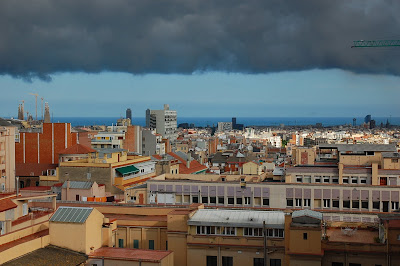Sunday, November 25, 2012
Thursday, April 12, 2012
Monday, August 22, 2011
the lives of lambs
High up in the clouds, J tries to catch a lost lamb.
The following day, we headed towards Mount Cook. It was sunny, blue sky, fluffy clouds (looked like lambs?) big brownish-yellow snow-capped mountains all around us. At one point we came across a large flock of lambs that recently had their coats shaved. There must have been about 120 of them. They were running along the highway towards Mount Cook. It was fun to stop the car for a flock of lambs (there´s very little traffic on this highway). When I slowly approached in the car I was able to get a close look at them; and what I saw was so repugnant and stomach-churning that I won´t ruin your day by writing it here or posting the photos. (At least not for now!) Lambs don´t live such a cute pastoral life as many many imagine. I will never be able to think "cute" when i think of lambs anymore. I´ll hint, though, that it wasn´t death, and that the color and texture of the lambs´recently-shaved coats--snow-white, thick and wavy--emitted a tremendous emotional effect, created a sharp color-affective contrast with...the grotesque aspect.
There were two other times when I experienced this feeling. Fictional textual experiences. One was in Michael Haneke´s excellent film Caché, and the other was in one of the best novels ever: Haruki Murakami´s Chronicle of a Wind-Up Bird when a soldier is skinned alive. (...)
May be on my way to becoming a vegetarian.
Sunday, December 05, 2010
紅葉狩り "momijigari"
紅葉狩り momijigari. A Japanese word meaning "to watch the autumn leaves change colors."
This activity may be somewhat common in Tokyo (in Autumn).
Some momiji trees that live in the city are artificially illuminated at night.
Autumn in Central Japan lasts about two months (mid-October to mid-December).
The momiji leaves are small and thin, like paper stars.
A long shutter speed after sundown can intensify their color.
Tuesday, June 15, 2010
Thursday, August 11, 2005
surrogate mother nature
Though much of the veneration of the old is just hegemonic and corporate image/media spoof, we could ask ourselves if there is something real in this relation, something in our biological natural instincts that attracts us to the old? If we eliminated all collective influence, what urban public spaces would we be drawn to/holding history/meaning for us? Could it be reduced to those spaces which we recognize as authentically natural (which usually are old)? Entirely man-made, the city, to begin with, is the antithesis of Nature.Nature and humanness have been being replaced by heightened global warming, technology, architecture that reflects technology, and surveillance, all of which favor a more independent/private lifestyle particularly in areas (such as the new balconyless flat buildings in Barcelona's Ciutat Vella, the general lack of benches, and the recent installation of bancos unipersonales (to stop people from lying down), and personal mobile music players become more popular…) which decrease social interactions particularly where tourists and upper-class residents frequent. In many of the dry cities of South-West Europe there is little green. Parks are replaced by “plazas duras” —flat sheets of gray cement with a thin sprouting tree exactly every some calculable distance. For this reason, one hot summer day when I took refuge on the shaded steps of an old church it occurred to me that, in the city, Mother Nature had appropriate the old; a true urban “Giving Tree.” Contrary to the impersonal, generic, banal, hard and flimsy Postmodern urban spaces (like those that were constructed in Barcelona for and after the Olympics, the old spaces/ruins (particularly those not surrounded by gates, surveillance or tourist stands) are generally public, imperfect, approachable, generous, palpable, they’re soft and soothing but solid and dependable, moss or vine-covered, pigeons and stray cats make they’re homes in the organic niches between their stones, they offer you a place to rest. Unfortunately, they’re also going extinct.







